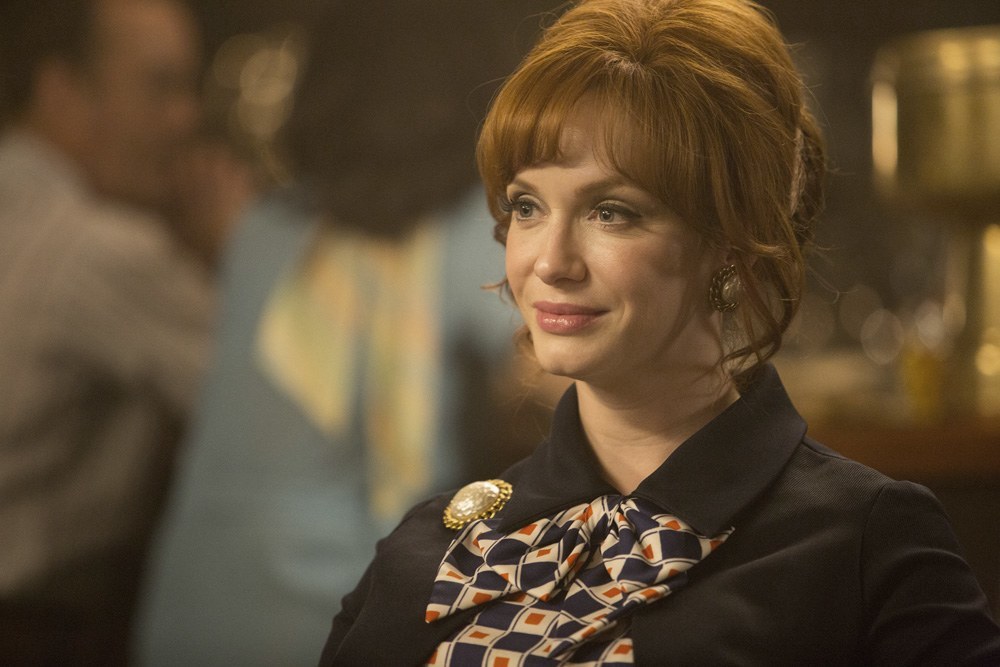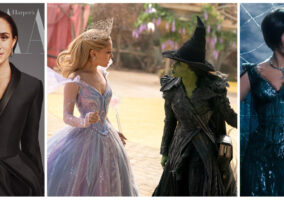 Christina Hendricks in “Mad Men” on AMC
Christina Hendricks in “Mad Men” on AMC
Once every season, it’s like Matthew Weiner & Co. take a look at all the hard-working recappers, commenters and critics out there in TV land, and hand them an episode where all the themes and subtext are spread out on a platter, with virtually none of the show’s trademark subtlety muddying up the message. From Peggy literally surrounded by children to Jim Hobart’s “Get thee behind me, Satan” pitch to the soon-to-be former partners of SC&P, everything was about as obvious as an episode of Mad Men gets. The pigeons were all coming home to roost as old grudges and old sins reared their heads unexpectedly and forced our characters into directions they didn’t want to go or confessions they weren’t prepared to make. Mad Men wouldn’t be the show it is without its trademark dreamy subtlety, but sometimes it’s nice to get one of these bold, bright-line episodes that really lays it all out in such a way that even the characters can see what’s happening to them. And while these people probably wouldn’t have used the term in 1970 to describe the feeling, it was clear to all of them what was happening: payback, on both personal and karmic levels.
For Peggy, it felt like the universe conspired to make her feel as bad as possible about her choice to give up her child a decade ago. First, Stan teases her about her apparent reputation for not liking children and then proceeds to show her not just the right way to connect with them, but just how removed from them she’s made herself. This primes her for the next moment, where she winds up all but attacking a mother for leaving her child behind in the office. While we kind of agreed with Peggy that this lady probably shouldn’t be winning any Mother of the Year awards (And did you notice the HIGHLY JUDGMENTAL up-and-down look of disgust Peggy gave the big-haired, heavily made up mother when she first walked in? You can take the good Catholic girl out of Bay Ridge …), she was out of line for attacking this woman and clearly couldn’t see the irony that she was judging one mother’s choices while feeling at the same time like the world judges her just as harshly for her own. “How the hell did that turn into that?” asks a bemused Stan, not realizing what so many of the characters were learning this week: that the past, with all its choices and mistakes, is never really that far from the present and it can erupt in your face unexpectedly at any time.
In Peggy, that eruption produced the closest thing we’ve seen to the girl who had a psychotic break after unexpectedly giving birth ten years ago; a total drop-the-veil moment where you see not only how much pain this decision has caused her, but how dangerous it is for her to indulge in thinking about it too much. “She shouldn’t have talked to me that way”, she says with a manic undertone, her eye twitching slightly, and we feared we were on the verge of another Ginsberg-style breakdown. When Stan tries to make a well-meaning but horrifically condescending point about how Peggy has a career instead of children, she snaps back into the Peggy we know; the one who defends herself and her choices with admirable ferocity. When Stan jokes about not knowing whether he’s fathered any children, she says bitterly “That’s funny to you. You can walk away.” It’s clear that Peggy, despite most of what we’ve seen of her in the previous decade, has never been able to simply walk away from that decision. It’s always been just under the surface for her. And in the absolute best, purest Peggy fashion, in the middle of her pain, she drops one hell of a truth bomb about women, their mistakes, and their choices: “She should be able to live the rest of her life, just like a man does.” That’s as close to a Peggy Olson manifesto as we’re ever going to get. It’s enough. And the quadrupled salary she was quoted by that headhunter if she goes to McCann sure can help soften the blow now and then.
What fascinates us most about this scene – and we should mention that it was electrifying, with fantastic performances by Moss and Ferguson – is the way Peggy described what happened to her child. “I’m here,” she says haltingly, and then after a long pause, “and he’s with a family somewhere.” Compare this to the only other time she ever admitted that she had a child, the scene in season 2 when she told Pete ( a scene that was deliberately mirrored this episode): “Well, one day you’re there. And then all of a sudden, there’s less of you. And you wonder where that part went. If it’s living somewhere, outside of you. And you keep thinking, maybe you’ll get it back. And then you realise, it’s just gone.” She uses place and distance – “here” “somewhere” and “there” – to describe the status of her child and the parameters of her decision. Peggy had a child and that child is forevermore “not here.” That’s how she’s always seen it. And as she explains to Stan, that’s how she’s had to see it. “I don’t know,” she says about her child’s life, “But it’s not because I don’t care. I don’t know because you’re not supposed to know, or you can’t go on with your life.” It’s heartbreaking and poignant, because you can hear the good Catholic girl who’s just reciting what she was told to do back then. And sadly, you can hear the doubt in her voice that she’ll ever fully go on with her life. And then, once again, Peggy Olson fiercely rights herself and returns to form. “I didn’t know,” says Stan weakly. “Well,” she snaps, “You don’t know lots of things about lots of people. That’s the point.” When he tries to reach out to her, she says what could be the Mad Men mantra of delusion: “I’m fine. I have work to do.” Work makes the pain of life bearable or at least it allows you to forget it for a while. Ever Don Draper’s protege.
But Peggy’s not the only one thinking about this long-ago choice. Pete momentarily has a stab of nostalgia and regret when he sees Peggy getting hugged (much against her will) by a child, and calls her into his office, to sit on the couch together (like old times) and share a moment. But it’s not reminiscing Pete wants to do; he warns her about the dissolution of the agency because there’s always going to be a small part of him that feels he owes her something, but really, he wants to feel a little sorry for himself and Peggy’s the one person in the office he can turn to for that sort of thing. “You’ll do great,” she says, trying to console him and allay his constant self-doubt. But like her, he snaps back to form after a moment of letting the veil slip:”You should get back to work.”
Like her, he’s feeling the stab of regrets over past decisions and the sudden eruption of past sins in his face. Ken clearly enjoys treating Pete as badly as he possibly can and later in the episode, factors Pete’s past treatment of him (“You’re not exactly an innocent bystander.”) into his glorious fuck-you of a moment to the partners – and the very future – of the agency that treated him so badly for so long. As much as we wanted to see a triumph for the agency again, we had to cheer a little for Ken’s moment.
On top of everything else, Pete comes face to face once again with his failed marriage and a Trudy who seems to be losing her light; a prospect that angers and saddens him, and for which he feels no small amount of guilt. “Your little girl scored very low on her ‘draw a man’ test,” he’s told by the headmaster of Greenwich Country Day, making sure the subtext is blared trumpet-loud in a scene both tragic and hilarious. And if that wasn’t enough, if Pete’s own sins weren’t enough to weigh him down this day, then 300-year-old family sins suddenly erupt in the unlikeliest of places, giving him at least one small moment of triumph as he gets to punch someone – anyone – for getting in the way of what he wants. It turns out, despite what Trudy said, they weren’t turned down by the school because they’re divorced. They were turned down because Pete’s an absentee father (note how much he wanted to avoid seeing Tammy when Trudy kept asking him to stay) with a family name that tends to cause more problems than good. “Just be grateful you can remarry and rid yourself of that name,” Headmaster MacDonald tells Trudy, but if we didn’t know better, we’d swear there’s a big part of her that wants to remain Mrs. Campbell. “You never take no for an answer,” she says gratefully when Pete tells her he’ll fix the situation with the school. We’re surprised to find ourselves hoping for a happy ending for these characters –especially since we’re prepared for very few happy endings when the series finale bows. They seem kind of miserable apart from each other. And even Pete seems more than over his life-long bond with Manhattan. “The city’s a toilet,” he tells Trudy with disgust.
In other payback news, Lou Avery thinks he’s really sticking it to Don by quitting, but the irony is that Don absolutely couldn’t have cared less. In a different situation it might have mattered, but Lou is a man whose career sounds like a series of missed opportunities and he wanted one last shot at taking out his frustrations on the kind of swaggering hot shot he never was. “Enjoy the rest of your miserable life,” he says to Don as a sign-off, yet another line that could serve as manifesto/mantra/tag line for the series. Mad Men: Enjoy The Rest of Your Miserable Life.
But these are sidestories in service to the main event, which is the bombshell news that McCann finally won the battle that has been raging under the surface of Mad Men since all the way back in season one, when Jim Hobart first tried to poach Don away from Sterling Cooper by flattering Betty and dangling the return of a modeling career to her.
“You are dying and going to advertising heaven,” Hobart tells the former partners of SC&P, but he sounds more like Satan as he dangles various worldly temptations (in the form of dream clients) in front of them. In a perfect close-the-circle callback, he whispers “Coca-Cola” to Don, which was the client he had Betty model for ten years ago when he first tried to ensnare him.
Despite what Hobart said, they’re not all going to career heaven. Among all of them, this is by far the worst news possible for Joan, who Hobart never even bothered to acknowledge in the meeting. She’s seeing with clear eyes the life she’ll have working in a place like McCann, where she was subjected to some of the worst sexual harassment of her career.
What made this all the sadder was the failed attempt to prevent it from happening at all – one that, in retrospect, was simply part of a long line of failed attempts to forestall the inevitable. This was, after all, exactly what happened to all those “Mad Men” boutique agencies of the 1960s; they got bought out by ever-expanding agencies in an ever-shrinking pool of competition. This is not only part of the history of American advertising, but it’s the total history of American business in the past 50 years. This was inevitable, both from an outside-the-story historic perspective and an inside-the-story thematic one. Don tried to get a little of that old “Shut the Door, Have a Seat” swagger going, and for a minute, it looked like the Draper magic might come through, but then something truly terrible happened; worse in its own way than Don’s disastrous Hershey pitch meltdown: someone interrupted Don in a middle of a pitch and told him to sit down and be quiet. “You won,” Jim Hobart says to him softly, but that one moment was full of loss and failure on a profound level for Don. “Boldness is always rewarded,” said Roger to Ken, but this time, it really wasn’t.
For Roger, the news that his family’s business, and the only thing left that bears the Sterling name besides himself, will be dissolved has left him melancholy, but in typical Roger fashion, unbowed. While he’s obviously saddened by the loss of the agency and the fact that no one will carry on his family’s name (made all the harder because he knows he has a son), he’s ever the happiness-seeker and thinks he might be able to find it this time in the form of Marie Calvet. Amazingly, Don seems more amused than concerned by the news, which only speaks to how much shit has been piled on him lately. And as Roger pointedly noted to him when he signaled mild disapproval (“You know she’s crazy, right?”), Don once came down hard on him for marrying his secretary and then turned around and did the exact same thing. Another perfect payback moment that Roger more than earned (and has probably been holding onto for the right moment to use for years). To Don’s credit, he laughs it off and, in his words, “surrenders.”
Don, like Roger and Ted, is trying to find a way to accept this. Ted is just plain happy about it because, to be honest, Pete’s cruel assessment was right. He is a bit of a sheep. He just wants to do his work and not be asked to make big decisions. He literally wants to be a cog in a larger machine. For Roger, he’ll always have his money and in typical Roger fashion, is giddy at the beginning of a possible new relationship. Don is, whether he can admit it or not, intrigued by the power and possibilities Jim Hobart is offering him and trying not to see the loss of his autonomy. “This is the beginning of something, not the end” he pleads, in yet another failed pitch – this time, to the annoyed and scared employees of SC&P, who literally walk out of a Don Draper speech because they don’t believe the bullshit he’s shoveling. The mystique of Don is well and truly dead. He can’t even make secretaries listen to him or pay him any respect anymore. “What’s in a name?” he asks Roger. Don Draper has lost his family, his wife, his home, and now his career. The only thing he has left is his name – and it’s not his name.
For more discussion on your favorite shows, check out our TV & Film forum.
[Photo Credit: Justina Mintz/AMC]
Orphan Black: Transitory Sacrifices of Crisis Next Post:
Michelle Obama in Zac Posen at the 2015 White House Correspondents’ Dinner
Please review our Community Guidelines before posting a comment. Thank you!



